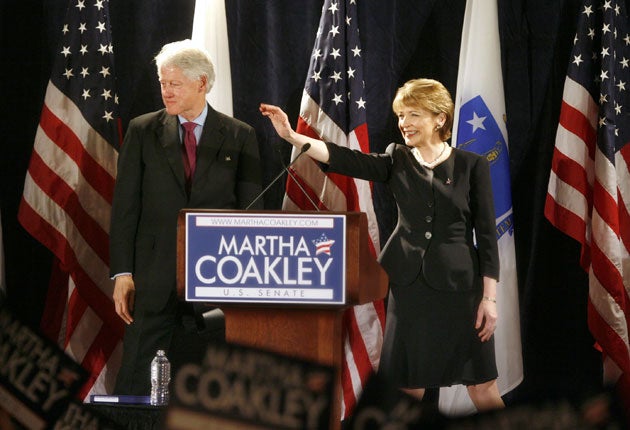Democrats facing loss of Kennedy's former Senate seat
Barack Obama puts reputation on the line in effort to prevent unthinkable defeat in Massachusetts

Your support helps us to tell the story
From reproductive rights to climate change to Big Tech, The Independent is on the ground when the story is developing. Whether it's investigating the financials of Elon Musk's pro-Trump PAC or producing our latest documentary, 'The A Word', which shines a light on the American women fighting for reproductive rights, we know how important it is to parse out the facts from the messaging.
At such a critical moment in US history, we need reporters on the ground. Your donation allows us to keep sending journalists to speak to both sides of the story.
The Independent is trusted by Americans across the entire political spectrum. And unlike many other quality news outlets, we choose not to lock Americans out of our reporting and analysis with paywalls. We believe quality journalism should be available to everyone, paid for by those who can afford it.
Your support makes all the difference.US President Barack Obama is making an emergency trip to Massachusetts today in an attempt to prevent the unthinkable – the loss of the Senate seat held by Edward Kennedy that would cause panic in his Democratic Party and probably drive the final nail into the coffin of his signature issue, healthcare reform.
With 48 hours to go until Tuesday's vote, polls show that the little-known Republican Scott Brown is running level with or slightly ahead of Martha Coakley, the state's attorney general, who until a little more than a week ago was seen as a certainty to win one of the safest Democrat seats in the country.
The stakes suddenly have become enormous. Victory for Mr Brown would not only give Republicans a 41st vote in the Senate that would enable the party to block approval of the healthcare bill. It would also terrify Democrats facing mid-term re-election contests in November and imperil the rest of Mr Obama's ambitious legislative programme.
So great is the danger that the President has been forced to take time away from vital issues of the moment to try to shore up Ms Coakley's faltering candidacy in person. Nor is he the first of the Democrats' big guns to do so. On Friday former president Bill Clinton was in Massachusetts, telling voters at one rally: "You just have to decide if you want to pick the person who gets to shut America down." In Washington, Massachusetts Congressman Barney Frank, one of the most powerful Democrats on Capitol Hill, declared: "If Scott Brown wins, it'll kill the health bill."
Whatever the outcome – and many observers believe that Ms Coakley will ultimately prevail in a bedrock Democratic state – Democrats are already trying to work out why what appeared an electoral canter has instead produced so nail-biting a finale. Perhaps lulled by complacency after easily winning last month's Democratic primary, Ms Coakley has staged a lacklustre campaign. Another reason is the timing of the vote, in the middle of winter, one day after the long Martin Luther King holiday weekend. Mr Brown has run an energetic campaign, portraying himself as an independent-minded "JFK Republican" who is reliably conservative on national security and the economy, but relatively liberal on social issues.
But other factors are at work. Just a year into his presidency, Mr Obama has seen his approval ratings slide to below 50 per cent, one of the lowest ever for a president so early in his first term. In that sense his visit – preceded by a video warning to supporters that his entire change agenda "probably rests on one vote in the United States Senate" – is a gamble. It by no means guarantees success for Ms Coakley, and if she were to lose, his own credibility would take a severe hit.
Working against Mr Obama as well is a growing mood of grass-roots resentment against the government, the health bill, deficits, immigration and the establishments seen as responsible for the economic crisis.
The immediate beneficiaries are Republicans, who exploited the resentment to win the 2009 governors' elections in Virginia and New Jersey. But events are also a sign of the growing impact of the Tea Party movement, as a channel for voter disgust. Some polls suggest the Tea Party is now more popular than either of the main parties. It has particular appeal to independents, who make up half of registered voters in Massachusetts, and whose defections have been the biggest factor in Mr Obama's decline in the polls.
Join our commenting forum
Join thought-provoking conversations, follow other Independent readers and see their replies
Comments